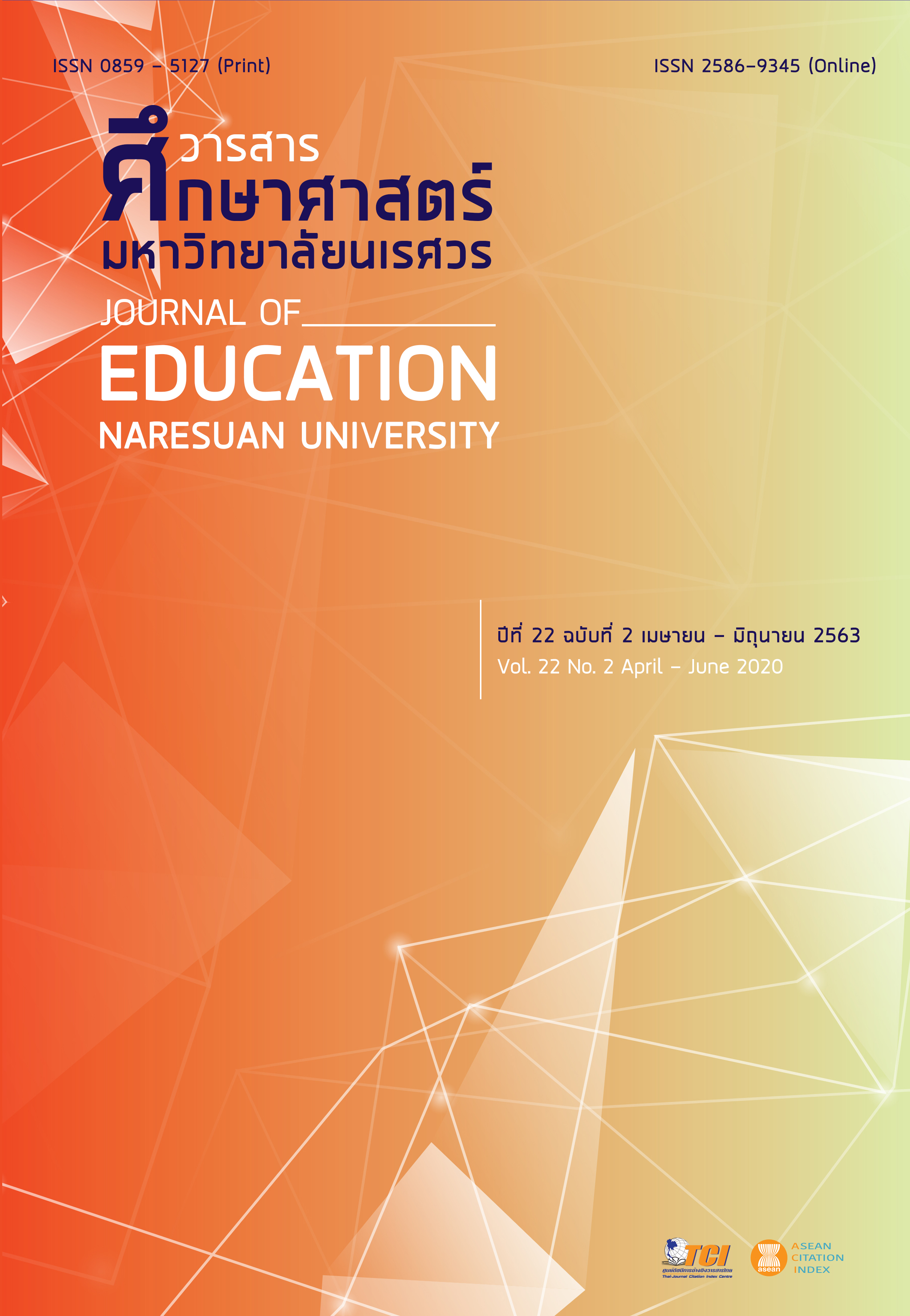THE DEVELOPMENT OF A LEARNING MANAGEMENT MODEL BASED ON COMMUNICATIVE LANGUAGE TEACHING AND TASK BASED LEARNING TO ENHANCE COMMUNICATIVE COMPETENCE FOR GRADE VI STUDENTS
Main Article Content
Abstract
The research was 1) to study learning management to enhance grade VI students’ communicative competence, 2) to construct a learning management model based on Communicative Language Teaching and Task Based Learning and study its qualities, 3) to implement the learning management model and study its results on (1) students’ communicative competence after using the learning management model, (2) students’ communicative competence by comparing pretest and posttest scores, and (3) students’ satisfaction toward the learning management model. The research consisted of 3 steps of research and development processes: 1) studying teachers’ learning management and the way to enhance students’ communicative competence by conducting an interview with 5 English teaching experts, 2) constructing a learning management model which was evaluated by 5 experts and studying its quality by implementing it to a pilot group of 30 grade VI students to study an effective index, and 3) implementing the learning management model. Specific sample used for the experiment were 32 students of Banbung School. The research results were as follows:
1. The learning management as a way to enhance student’s communicative competence should provide language learning opportunities as well as include various communicative activities. The tasks should be attractive, enjoyable and suitable to learners’ age. Moreover, the assessment and evaluation of learning management should follow the Common European Framework of Reference for Languages (CEFR) and incorporate with school curriculum and context.
2. The learning management model consisted of principles, goals, contents, instructional processes, and measurements and evaluations. The learning management model consisted of 3 components; 1) presentation (lead in, elicitation and explanation), 2) practice, and 3) production (pre-task, during-task and post-task). The experts agreed to the quality of the learning management model at the high level (4.33 of 5-level scales). The effective index of the learning management model was .5327.
3. When the learning management model was implemented, it was found that:
3.1 The students’ listening competence was at fairly good level, speaking competence was at satisfactory level, reading competence was at sufficient level and writing competence was at marginal pass level. The overall competence was at satisfactory level.
3.2 The students’ communicative competence after learning through the learning management model was higher than before learning at the 0.05 level of statistical significance.
3.3 The students’ satisfaction toward the learning management model was at a high level (4.21 of 5-level scales).
Article Details
The owner of the article does not copy or violate any of its copyright. If any copyright infringement occurs or prosecution, in any case, the Editorial Board is not involved in all the rights to the owner of the article to be performed.
References
Angwattanakul, S. (1997). Teaching English. Bangkok: Chulalongkorn University Printing. [in Thai]
Byrne, D. (1986). Teaching oral English. London: Longman.
Ellis, R. (2013). Task-based language teaching: Responding to the critics. University of Sydney Papers in TESOL, 8, 1-27.
Ellis, R. (2003). Task-based research and language pedagogy. Language Teaching Research, 4(3), 193-220.
English Language. (2015). The manual of new English teaching based on the common European framework of reference for languages. Bangkok: np. [in Thai]
Joyce, B., & Weil, M. (2009). Models of teaching (8th ed.). Boston: Pearson.
Jutanun, L. (2001). Teaching English according to the curriculum. Bangkok: The Master Group Management. [in Thai]
Koosha, M., & Yakhabi, M. (2013). Problems associated with the use of communicative language teaching in EFL contexts and possible solutions. International Journal of Foreign Language Teaching and Research, 1(2), 77-90.
Long, M., & Crookes, G. (1992). Three approaches to task-based syllabus design. TESOL Quarterly, 26(1), 89.
National Institute of Educational Testing Service. (2017). The summary of Ordinary National Educational Test (O-NET) of Grade 6 Academic Year 2016. Bangkok: National Institute of Educational Testing Service. [in Thai]
Preedekun, A., Mejang, A., Ngaorungsi, K., & Kaewurai, W. (2010). The development of a listening and speaking English skills instructional model based on communicative approach and brain-based learning principles to enhance communicative competence of Rajabhat University students. Journal of Education Naresuan University, 13(Special Edition), 154-175. [in Thai]
Willis, J. (1996). A framework for task-based learning. Edinburgh: Addison Wesley Longman.
Xiaotong HE. (2014). An analysis of communicative language teaching methodology and its application on language learning in China. Higher Education of Social Science, 6, 100-105.
Zhang, Xiangyang & Hung, Shu-Chiu. (2013). A case study of exploring viability of task-based instruction on college English teaching in big-sized class. Journal of Language Teaching and Research, 4(4), 693-699. doi10.4304/jltr.4.4.
Zuniga, E. C. (2016). Implementing task-based language teaching to integrate language skills in an EFL Program at a Colombian University. PROFILE Issues in Teachers’ Professional Development, 18(2), 13-27.


